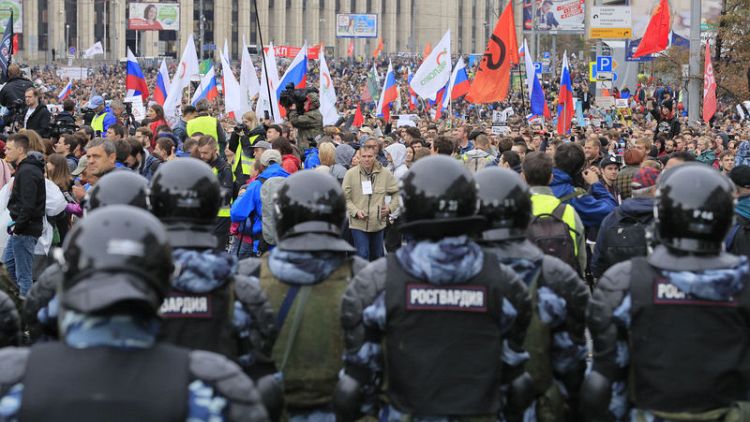By Tom Balmforth
MOSCOW (Reuters) - Over 550 Russian academics and scientists accused the Kremlin on Thursday of waging a campaign of repression against activists who have staged some of Russia's biggest anti-government protests in years.
In an open letter, they demanded that criminal cases be dropped against more than a dozen people who face up to eight years in jail for what police have said was mass unrest at a recent opposition protest over a local election next month.
Opposition figures say their protests were peaceful and have accused the authorities of trying to intimidate them with legal action as well as beatings.
Police have briefly detained over 2,000 people at rallies that they said were unauthorised and that were forcibly dispersed. Almost the entire entourage of opposition politician Alexei Navalny have been given short jail terms.
"We demand that the people who are running the state apparatus stop this legal arbitrariness, end the political repression and start strictly following the norms of the constitution," the academics wrote in the letter, published online by the Troitsky science newspaper.
The protests began last month when more than a dozen opposition politicians were barred from taking part in an election for the Moscow city legislature. They were accused of failing to collect enough signatures of support, something they deny.
"We are watching with alarm as the rejection of lies in Russia is becoming criminally punishable, and political repressions are accompanied by the rise of absurd accusations, particularly concerning mass unrest and external interference," the letter read.
President Vladimir Putin has defended the banning of opposition election candidates, saying that they falsified signatures, and has said those who break Russia's protest laws should be held responsible.
The rallies have turned into Russia's biggest sustained protest movement since 2011-2013, when protesters took to the streets against perceived electoral fraud.
Kremlin critic Lyubov Sobol said Moscow city authorities had already denied the opposition permission to stage another demonstration on Aug. 31, potentially setting the stage for renewed confrontation.
Kremlin spokesman Dmitry Peskov told reporters that he had not seen the open letter, but that it was important to listen to academics.
(Editing by Kevin Liffey)
